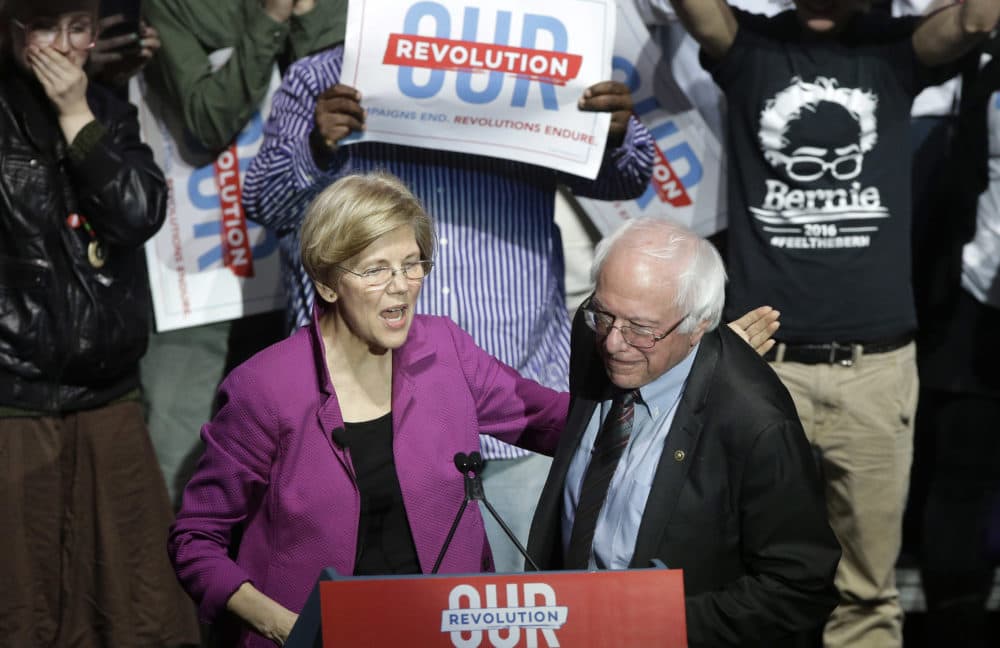Advertisement
Sanders And Warren Appear Headed For A Clash In New Hampshire
Resume
In the crowded field of Democrats running for president, Elizabeth Warren and Bernie Sanders have a lot in common. That means they're fighting for the same voters, who could face a difficult choice.
Here's some of what the two progressive senators have in common:
- They both come from states that neighbor New Hampshire, which means they're both counting on what amounts to home-field advantage in the first-in-the-nation primary state.
- Both decry the dramatic income inequality that increasingly defines the economy. They both say that Washington is corrupt, that it's working primarily for large corporations and the very rich at the expense of working Americans.
- And both are pushing for big changes: Warren for what she calls "systemic change," and Sanders for what he calls "a political revolution."
"This campaign is going to transform our country," Sanders told a packed auditorium in Concord this past Sunday, at his first rally in New Hampshire since announcing his second run for president.
"[This revolution will] finally create an economy and a government that works for all of us, not just the 1 percent," Sanders declared to a cheering crowd of about 850 people who braved a snowstorm and treacherous roads to attend the rally.
In Manchester in January, at her first presidential rally in New Hampshire, Warren offered a similar message.
"An America that works only for the wealthy and well-connected — that's corruption, plain and simple," she said, "and we need to call it out for what it is."
Warren and Sanders also advocate for many of the same goals, including higher taxes on the wealthy, Medicare for All and the Green New Deal. These are among a number of progressive positions that many in the crowded Democratic field support, a fact for which Sanders took credit on Sunday. The Vermont senator said that when he launched his first bid for the White House in 2015, many politicians and members of the media labeled them "radical."
"'Too radical! Oh my god, we can't do that,' " Sanders said with obvious sarcasm. "Today, virtually all of those ideas are supported by a majority of American people. And they are being supported by a majority of Democratic candidates — from school board to president of the United States."
In 2016, Sanders won 22 state caucuses and primaries, including in New Hampshire, where he thumped Hillary Clinton by 22 points. So he begins his second White House bid with a big head start.
"Bernie really worries about the little guy," said Susan Dodge of Sanbornton, New Hampshire, who voted for Sanders in 2016 and who says she will vote for him again next year. "That's his major concern. He sticks by his message — always has and always will."
But the New Hampshire primary is almost a year away — a lifetime in politics — and there's no guarantee that Sanders can count on the legion of supporters that backed him last time.
For example, Ray Lanier of Concord voted for Sanders in 2016, but now says he has two big concerns: Sanders' age (he's 77), and whether or not he can beat President Trump.
"I certainly understand what age does to you," said Lanier, who is 78, and who is now considering backing Warren.
Asked how the two senators differ, Lanier answered with one word: "Style."
"As far as policies, I don't see much difference between them," Lanier said.
Style is one difference between the two. Sanders comes from a long tradition of political activism and favors big rallies, long policy speeches, and rarely mentions his own biography.
By contrast, Warren, the former professor, favors smaller events, where she can go one-on-one with voters. And she offers personal stories to explain what ails America today — for example, how her mother held her family together with a minimum wage job at a time when Washington lawmakers asked, "What does it take for a family of three to survive?" Warren says today, lawmakers ask, "What increases the profitability of giant companies?"
"I am in this fight because I think they should be asking about little families instead of about giant multinational corporations," Warren declared.
But the bigger difference between the two has to do with their fundamental beliefs and how they describe them.
Sanders is a self-described Democratic Socialist, and his political "revolution" is about using blunt language to challenge some of the basic institutions of the capitalist system: the insurance and pharmaceutical industries, the military industrial complex and Wall Street.
"If you think we're going to get affordable loans to small businesses, you're going to have to deal with Wall Street and start breaking up these huge banks," Sanders said on Sunday.
Warren, too, wants to break up the large banks, and has recently proposed breaking up the big tech companies. But she's not a Democratic Socialist. In fact, she's a former Republican and a committed capitalist, who says she believes in markets — something you would never hear Sanders say. Warren says "markets work — when they have rules and cops to enforce them."
"A market without rules is theft," Warren says.
The Massachusetts senator can point to her work setting up the Consumer Financial Protection Bureau as an example of what she means by having a cop enforcing the rules.
So Warren and Sanders could represent a tough choice for progressives in New Hampshire — especially with so many other Democrats in the race.
But the fact that they come from neighboring states gives the two senators the advantages of being better known. But it also raises expectations for them to do well — and possible political peril if they don't.
This segment aired on March 13, 2019.
